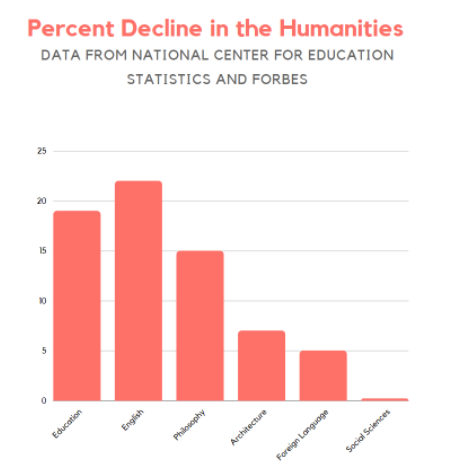Humanities may be complementary to STEM, not antithetical

Information from the National Center for Education Statistics and Forbes indicates the percent decline in humanities related fields using data from 2005-2006 and 2015-2016.
May 25, 2021
The percentage of humanities degrees has dropped by more than half since the 1960s according to the Wall Street Journal. STEM is often looked at as more difficult, with a binary right or wrong answer and no room for mistakes. On the other hand, there are often more variables to consider in the humanities, which allows for more than one right answer. Although some may argue that there could not be a larger contrast between the two subject areas, STEM and the humanities share common goals of improving the quality of life of individuals in society through an understanding of the natural world and human needs.
According to Forbes, the percentage of graduates pursuing STEM degrees have increased over the past decade while that of graduates pursuing the humanities have decreased. A considerable reason for these changes may be the allure of high salaries and prestigious job offerings that are associated with STEM degrees. Data from the American Academy of Arts and Sciences in 2018 shows that STEM majors can potentially earn from $10,000 to $30,000 more than their liberal arts counterparts in a starting salary.
“When it comes to certain demographics such as immigrants or lower-income people, STEM jobs can often guarantee a more financially secure future, as opposed to careers like the arts, where financial security may not be as guaranteed,” junior Mrudula Rapaka said. “Although this viewpoint is understandable, I do believe it is harmful.”
The high salary and financial cushion that seems to attract students to STEM fields may further a one-dimensional perception of career success. A study by Frontiers in Education concluded that evaluations of career success should be considered beyond income level. For example, making a specific and far-reaching impact, taking on a prominent role as a leader or deepening practical knowledge of a certain subject through hands-on projects can all be indications of career success.
“People often think in terms of a market-based perspective, which overvalues things that generally provide more [money], like [careers in STEM],” junior Shruti Ganapuram said. “This leaves artistic developments severely undermined and broadly painted as trivial.”
A study by Duke University found that satisfaction and interest in a field are key determinants of success, since they contribute to high-quality work, increased productivity and, above all, personal fulfillment. Therefore, it may be more beneficial for a student to enter a field they are genuinely interested in and place a less concentrated focus on monetary gain.
“I want to major in philosophy, and although this major isn’t the strongest when it comes to post-undergraduate opportunities, I know for a fact that I will absolutely regret any future in fields like math or science simply because I don’t enjoy them,” Rapaka said.
According to Chemical and Engineering News, colleges have increased the credits requirement for each major, which prevents students from taking courses in a wider range of subjects. Accompanied by the decline in interdisciplinary curriculums, students are forced to make a binary decision: STEM or the humanities. However, research shows that integrating the two has had many cognitive benefits and can be essential to an enriched learning experience.
“It’s important for students to get a grasp of interdisciplinary instruction because it entails an integration of methods where students have to think critically,” Ganapuram said. “This is necessary to have a more open-minded view on challenging issues and today’s problems.”
According to Inside Higher Ed, STEM-centered innovations and strides to understand the natural world are successful when they address societal inequities and human needs. The humanities provides the foundational understanding of social and cultural context in society necessary for impactful inventions.
The humanities can also be necessary to maintain morality in artificial intelligence. A combination of knowledge, experience and reasoning capabilities shape a human’s complex moral compass. According to Loyola University Chicago, while efficient, technology does not possess the nuanced sense of morality that humans do, and so certain areas in the humanities can help technology adhere to moral standards. An article by Fast Company states that global awareness and cross-cultural interactions are traits that come with humanities alone.
“STEM may [have] created [facial recognition], but who decides whether the use of the technology invades an intrinsic right to privacy? Humanities,” Rapaka said. “STEM may code computer algorithms, but who weighs whether racially-biased computer algorithms are worth the efficiency? Humanities.”
When integrated, research shows that STEM and the humanities may have far-reaching effects, like building a more open-minded populace and paving the road for creative innovations drawing from multiple disciplines. STEM and the humanities may also be more co-dependent than commonly believed. According to the National Academies of Sciences, Engineering and Medicine, science and other STEM majors are derived from philosophical methods of questioning and almost always use elements of the humanities in practical applications.
“STEM and humanities share one goal: improving society,” Rapaka said. “But they do this through different mechanisms. I think they are already intertwined in so many ways. STEM can’t function without humanities, and vice versa.”


